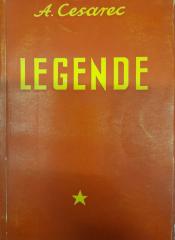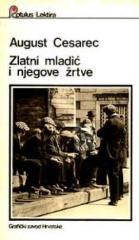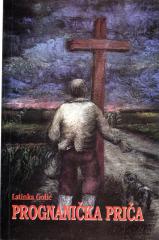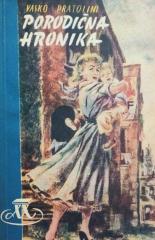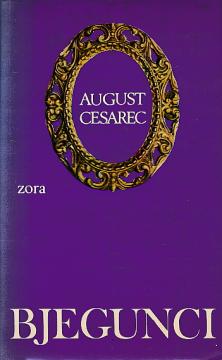
Bjegunci
Der Roman „Flüchtlinge“, den Cesarec in den 1920er Jahren schrieb und schließlich 1933 veröffentlichte, erzählt die Geschichte von Emigranten, die vor den jugoslawischen und ungarischen Regimen nach Prag, der Hauptstadt der damaligen demokratischen
Der Roman zeichnet ein Tableau, in dem unterschiedliche politische Positionen aufeinanderprallen, vertreten durch Sozialdemokraten und kommunistische Revolutionäre, bürgerliche Politiker, Reformisten und Mystiker. Er ist um den zentralen Konflikt zwischen der Studentin Buga und ihrer Mutter, einer heuchlerischen Aktivistin der bürgerlich-feministischen Bewegung Zagrebs (wahrscheinlich die Schriftstellerin Zofka Kveder), aufgebaut. Der Konflikt zwischen Mutter und Tochter geht jedoch über den privaten Horizont hinaus und spiegelt die gesamte Bandbreite widerstreitender politischer Seiten der 1920er Jahre wider, als die Bourgeoisie versucht, moralische und spirituelle Reformen durchzusetzen, die von jungen Revolutionsbefürwortern abgelehnt werden. Letztere werden jedoch weniger von Buga selbst vertreten als von ihren Bekannten, beispielsweise Nikola Višnjić, dem ihre Mutter vorwirft, Gewalt zu befürworten: „Und der Punkt ist, dass Višnjić zunehmend von den Ereignissen in Russland, dem Oktober, Brest-Litowsk beeinflusst wurde… Und insbesondere diese Brest-Litowsk-Logik empörte meine Mutter sehr, sie hielt sie für nichts anderes als ein Verbrechen.“ So wie die Mutter Višnjić vorwirft, revolutionäre Gewalt zu befürworten, so wirft Buljuz, der nicht nur ein Befürworter der Revolution, sondern ein völliger Fanatiker ist, Buga leere Phrasen und Defätismus vor: „Nur Kultur, Kultur, Inquisition, Inquisition, Menschlichkeit, Menschlichkeit… all das, was wir schon unzählige Male in verschiedenen Phrasen gehört haben… [...] Und wenn es dann darum geht, Menschlichkeit zu erreichen, dann lehnt er diesen Kampf ab, genau wie Sie!“ Anders als Buga, die der korrupten Familienökonomie zum Opfer fällt, gelingt es ihrem Kommilitonen, dem Künstler Ilija Koren, sich aus ästhetischen „Fantasien“ und „Träumen“ zu befreien und erlebt so ein politisches „Erwachen“: „Und ich möchte das Leben und die Dinge von Angesicht zu Angesicht sehen, so wie sie in Wirklichkeit sind! Und wirklich am Leben teilnehmen und daran arbeiten, dieses Leben zu verändern, selbst wenn ich, wie gesagt, mich selbst opfere!“ Nach dieser Transformation weist er auf private Belange als Haupthindernis für Bugas politische Subjektivierung hin. Ähnlich wie Višnjić, der ausruft, man müsse nur „wissen, wie man verwaltet und entscheidet, das ist alles!“, behauptet Koren, dass gerade das Aufblühen des Privatlebens – dessen Hauptträgerin Bugas Mutter ist – die politische Verwirklichung blockiert: „Nun, Mutter! Es besteht kein Zweifel, dass der Begriff Mutter etwas Großes ist, das uns alle auch heute noch mehr oder weniger eng an eine einzige Sphäre der Sensibilität bindet.“ Allerdings seien wir „umso unglücklicher, je mehr wir uns in unser Privatleben zurückziehen, je mehr wir uns auf unsere Intimitäten konzentrieren!“
Jedan primerak je u ponudi
